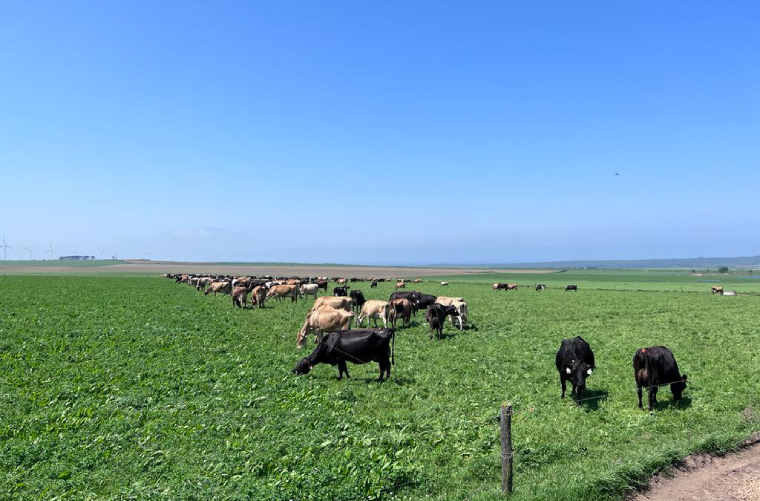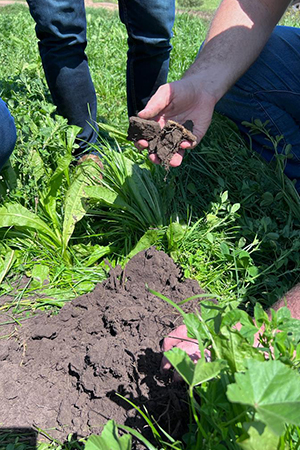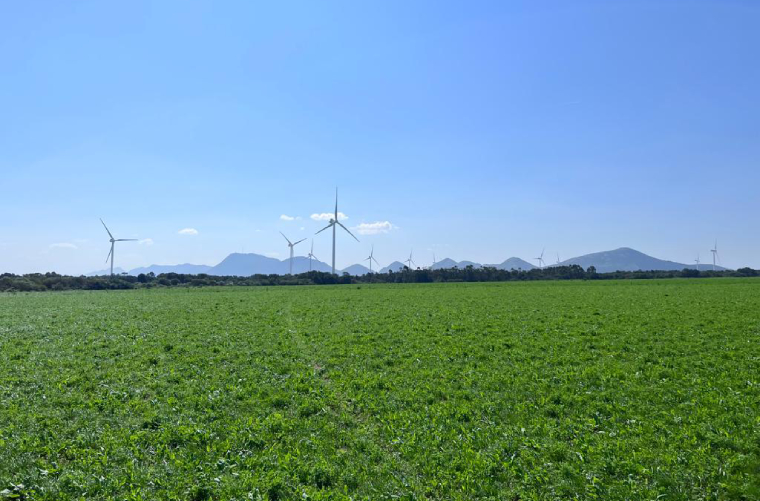In November, we signed an agreement with Climate Neutral Group (CNG) to purchase high quality removal emissions credits generated through its AgriCarbon Programme, an agricultural regeneration project in South Africa.

Our response to climate change is articulated in our Sustainable Mining Plan (SMP), Anglo American’s framework for delivering a more purposeful, resilient, agile and sustainable business; one that creates enduring value for all our stakeholders, while making a positive contribution to socio-economic development by reducing our environmental footprint, supporting biodiversity and leaving a positive legacy for the communities in which we operate.
As outlined in the Plan, our approach to decarbonising our operations builds on our commitment to reduce our Scope 1 and 2 emissions by 30% by 2030, and be carbon neutral across all our operations by 2040. An effective pathway to carbon neutrality will require a host of structural solutions; long-term measures that allow for traditionally carbon intensive processes to be carried out in a greener, emissions-free way.
We aim to achieve this through our ongoing deployment of low and zero emissions technologies, such as the capture of methane from our mines – our largest single source of Scope 1 emissions – as well as by introducing innovative means of displacing diesel such as, for example, the development of our nuGen™ Zero Emission Haulage Solution and introduction of the world’s first hydrogen fuel cell powered haul truck at our Mogalakwena PGMs mine in South Africa.
Our efforts to increase the proportion of renewables in our energy mix are also part of the solution, with an example being our recently-signed agreement with EDF Renewables in South Africa – a country which today relies on coal for 90% of its electricity – to form Envusa Energy. This jointly owned company will provide us with a blend of renewable energy, generated on Anglo American’s sites.
In this context, carbon offsets have an important role to play in supporting Anglo American’s decarbonisation strategy. More specifically, voluntary carbon credits, which can provide a credible way of taking action while new mechanisms to transition away from excess emissions, which may or may not exist today, are explored in the longer-term.
In November, we signed an agreement with Climate Neutral Group (CNG) providing us with access to high quality, removal emissions credits generated through its AgriCarbon Programme, an agricultural regeneration project in South Africa that rewards farmers for employing more sustainable land management practices and demonstrates the many benefits that carbon offset projects can bring.
Agricultural Regeneration. A solution for a more sustainable world
As well as driving climate action, carbon offsets help catalyse much-needed investment into green innovations – like sustainable land management practices or energy efficiency solutions – while also tackling broader environmental and social issues. One area that can benefit is agricultural production. According to a global assessment report published in 2019, “the value of agricultural crop production ($2.6 trillion in 2016) has increased approximately threefold since 1970 […]. However, indicators of regulating contributions, such as soil organic content and pollinator diversity, have declined, indicating that gains in material contributions are often not sustainable”1.
This challenge is more prevalent in a continent like Africa which, according to the recent UN report, has as much as 132 million hectares of degraded cropland, with the associated loss of land productivity significantly impacting the sustainability of its food systems2.
The contribution South Africa’s agricultural sector makes to the country’s overall GDP has steadily declined from 9% in 1960 to 2.4% today3.
Carbon offsetting can help, by unlocking better and more sustainable practices which aim to improve the productive potential of land through farming and grazing practices that, among other benefits, can reverse climate change by rebuilding organic soil matter and restoring degraded soil biodiversity4.
For Anglo American, this is important because it represents an opportunity for us to live our Purpose and values through targeting a broader societal contribution that extends beyond the metals and minerals we mine, to tackling other issues like food security.
AgriCarbon – a catalyst for improved land management
Founded in 2002, CNG is a leading provider of carbon offset projects and nature-based solutions. To-date, the company has supported more than 3,000 companies around the world to reduce their carbon emissions, mitigating over 12 million tons of CO2 and improving the lives of many thousands of people by contributing to various Sustainable Development Goals.
The company’s AgriCarbon Programme, its flagship carbon project, will be one of the first in the world eligible for approval under the Verra5 carbon methodology ‘VM0042: Improved Agricultural Land Management’6. The aim of the project is to help overcome barriers preventing farmers from adopting improved agricultural land management practices, limiting emissions through more sustainable farming techniques and helping to restore organic carbon to the soil.
Today, AgriCarbon covers 63 farms encompassing more than 40,000 hectares of land across the Eastern Cape and KwaZulu-Natal, where agriculture represents a major feature of the landscape, and where an average 1.2% of the natural landscape has been transformed per annum since 19947. This loss of natural capital and environmental degradation brings socio-economic consequences for the many rural inhabitants reliant on natural resources for fuel, fibre, food and medicine8.
The programme provides technical assistance where needed, and channels rewards for successfully employed climate mitigation and adaptation activities from the carbon markets back to the farmers. To qualify, those with farm crops or livestock within South Africa’s borders must provide background on their sustainable agricultural practices and, targeting an increase in overall soil carbon or decrease in farm emissions, outline their commitment to adopt a change across one or more of five core categories:
- Crop planting and harvesting
- Nitrogen fertiliser application
- Soil disturbance reduction
- Water management irrigation
- Grazing practices

Once approved, eligible farms share data related to their sustainable land management practices with the AgriCarbon team, including tillage (top soil agitation) and cropping details; produce and harvest, including cover crops and residues over the last five years; fertiliser application regiment, including both synthetic and organic fertilisers; stocking density, type of livestock, number and size of paddocks and pasture details (for livestock farms); and any records on soil testing, fuel use and irrigation, where available.
This data is submitted to an independent auditor, who verifies it to Verra, in order for realised improvements in soil organic content or GHG emissions reductions to be issued over an agreed timeframe; credits that are then sold on to corporate clients via the voluntary markets, with the farm in question benefitting financially from these transactions.
With the potential to boost agronomic productivity and advance food security, the project aligns with four of the UN’s Sustainable Development Goals – Zero Hunger (2), Responsible Production and Consumption (12), Climate Action (13) and Life on Land (15).
Prioritising high quality offsets aligned with our Sustainable Mining Plan
At Anglo American, we consider several factors when it comes to voluntary offset projects – including timeframe (short- or long-term delivery); whether emissions are avoided, reduced, or removed; and a project’s alignment to minimum quality standards for climate and development interventions, such as Verra’s Verified Carbon Standard (VCS). Whether a project has synergies with our own business, aligns with our core values, or has strong co-benefits are also factors we take into consideration.
The AgriCarbon Programme has several synergies with Anglo American’s strategy, roadmap to carbon neutrality across our operations and our aim to drive sustainable change across the communities in which we live and work. Which is why, in November 2022, we signed an agreement to purchase high quality, carbon removal credits generated by all project activity eligible for crediting within the project’s first carbon verification cycle, between July 2018 and June 2021, and spanning approximately 19,896 hectares of enrolled farmland.
Removal offsets represent ~10% of all offset issuances in the market – including avoidance and removal, and are considered a premium product as they support the removal of carbon dioxide from the atmosphere. The collaboration with CNG provides Anglo American with access to product from one of the highest-quality VCS removal projects under development in South Africa today.
This transaction has been coordinated by our Energy Solutions team. Zaheer Docrat, Executive Head of Energy Solutions, commented on the synergies and potential offered by the project, saying:
“Carbon markets can play an important role as part of our broader climate mitigation strategy, by delivering decarbonisation opportunities for our business and customers as practical alternatives – technologies and solutions – are further developed while, at the same time, helping to finance the growing number of voluntary projects that are emerging, and that have the potential to help us achieve our climate and broader sustainability goals.”

1 ‘The global assessment report on biodiversity and ecosystem services’, P. XV (Key Messages, Section, A3), by the Intergovernmental Science-Policy Platform on Biodiversity and Ecosystem Services (IPBES); May 2019; https://bit.ly/3YaKHaf
2 ‘Review of forest and landscape restoration in Africa’; Mansourian, S., and Berrahmouni, N.; published by the Food and Agriculture Organisation of the United Nations (FAO) and the African Union Development Agency-NEPAD (AUDA-NEPAD); 2021; https://bit.ly/3h1cd9b
3 Agriculture, forestry, and fishing, value added (% of GDP) - South Africa; World Bank; https://bit.ly/3VIaCUL
4 ‘What is regenerative agriculture?’; Regeneration International; https://bit.ly/2T2PEjd
5 Verra is an independent organisation which sets the standards for climate action and sustainable development projects
6 VERRA Registry Overview; https://bit.ly/3FAZgwl
7 ‘Climate Neutral Group’s AgriCarbon Programme rewards farmers’ (Press Release, published by CNG); 13 August 2021; https://bit.ly/3XYUNLe
8 ‘Systematic land-cover change in KwaZulu-Natal, South Africa: Implications for biodiversity’; Jewitt, D., Goodman, PS., Erasmus, BFN., O’Connor, TG., Witkowski, ETF.; published in the South African Journal of Science (SAJS), 25 April 2015; https://bit.ly/3P8ZrSQ




